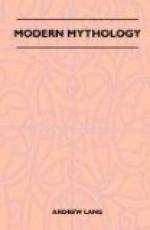Mannhardt’s Letters
’Mannhardt’s state of mind with regard to the general principles of comparative philology has been so exactly my own,’ says Mr. Max Muller, that he cites Mannhardt’s letters to prove the fact. But as to the application to myth of the principles of comparative philology, Mannhardt speaks of ‘the lack of the historical sense’ displayed in the practical employment of the method. This, at least, is ‘not exactly’ Mr. Max Muller’s own view. Probably he refers to the later period when Mannhardt ‘returned to his old colours.’
The letters of Mannhardt, cited in proof of his exact agreement with Mr. Max Muller about comparative philology, do not, as far as quoted, mention the subject of comparative philology at all (1. xviii-xx.). Possibly ‘philology’ is here a slip of the pen, and ‘mythology’ may be meant.
Mannhardt says to Mullenhoff (May 2, 1876) that he has been uneasy ’at the extent which sun myths threaten to assume in my comparisons.’ He is opening ‘a new point of view;’ materials rush in, ’so that the sad danger seemed inevitable of everything becoming everything.’ In Mr. Max Muller’s own words, written long ago, he expressed his dread, not of ‘everything becoming everything’ (a truly Heraclitean state of affairs), but of the ’omnipresent Sun and the inevitable Dawn appearing in ever so many disguises.’ ‘Have we not,’ he asks, ’arrived both at the same conclusion?’ Really, I do not know! Had Mannhardt quite cashiered ’the corn-spirit,’ who, perhaps, had previously threatened to ’become everything’? He is still in great vigour, in Mr. Frazer’s Golden Bough, and Mr. Frazer is Mannhardt’s disciple. But where, all this time, is there a reference by Mannhardt to ’the general principles of comparative philology’? Where does he accept ’the omnipresent Sun and the inevitable Dawn’? Why, he says the reverse; he says in this letter that he is immeasurably removed from accepting them at all as Mr. Max Muller accepts them!




